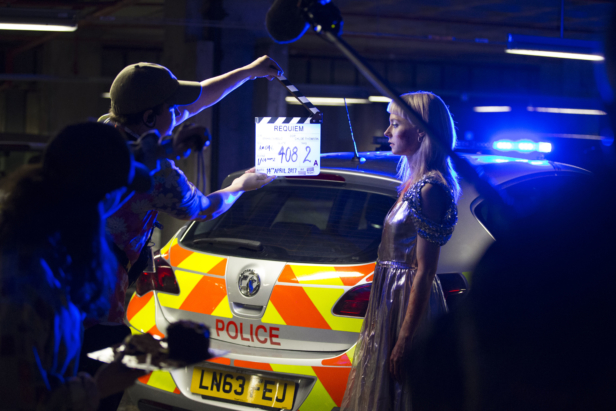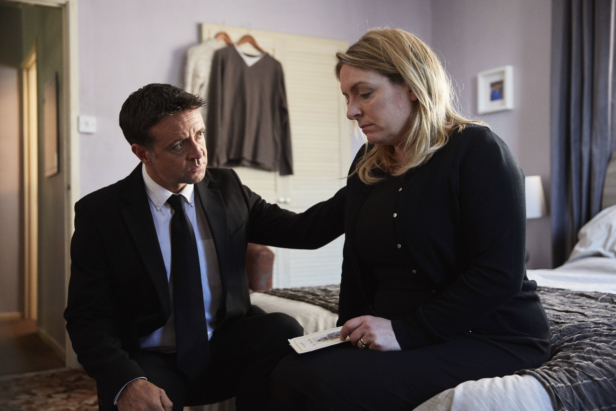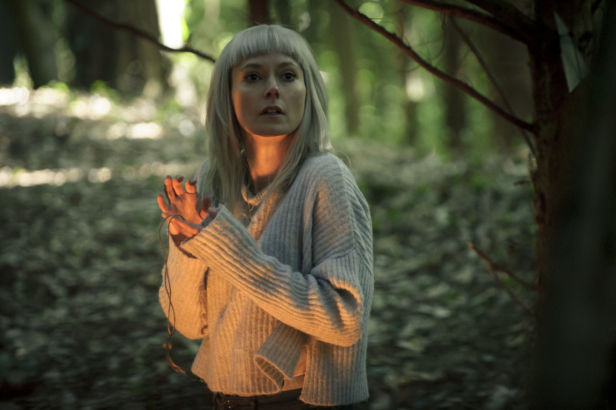With the likes of Black Mirror, American Horror Story and The Exorcist going strong, horror TV hasn’t been this good for years. Now, the BBC is setting out to bring a slice of horror to British screens with mini-series Requiem, which premieres on 2 February on BBC One. We speak to creator and writer Kris Mrksa to get a better view of what could be the most terrifying TV drama of the year…
SciFiNow: Where did the idea for Requiem come from?
Kris Mrksa: For me, I usually have a whole bunch of ideas going through my head and most of them are absolutely useless. But sometimes two or three of them come together in a very interesting way and I realise that they were meant to be all along. That’s when I realise I have something worth running with and that was certainly the case with Requiem.
The original inspiration actually came from when my mother died. I started thinking about how much of my own life, or my early life, at least, has in a way died with her, you know, because she was to some extent the custodian of my early life. I can’t remember my early life very much at all. Before seven or eight I’ve got quite a fragmentary memory, little bits and pieces. There’s nothing really clear or distinct, and secondly a lot of stuff is from a child’s point of view, so you don’t know what was happening. There’s a family Christmas where Uncle Bob was behaving strangely, but who the hell knows why? I guess my mum did, but I never will now because I never asked her those questions or dumb things like that. I don’t even know if i’m inoculated against measles or mumps or whatever the hell is it. She knew all of that stuff. Getting over the loss of a parent is a very distinctive kind of loss, I think. There could be nothing worse than losing a child, that’s got to be the worst possible kind of bereavement, but losing a parent [is also a loss] to your identity in a very interesting way. I was grieving her, but I was also grieving all the stuff in my own life that I’d never really know the answers to.
I know I’m talking a lot about grief and something that really was an awful loss in my life, but being a writer you can’t really help trying to turn it into a story [laughs]. That’s an intriguing sort of mystery, that in the loss of a parent someone might start questioning what they always thought was true about their early life and then suddenly realising that it’s going to be hard to find out the truth about their early life, and so maybe you could go off on a mission to find that truth out.

A lot of people will be able to relate to that as well.
Families are odd, and even if you have a relatively what is sometimes describes as a conventional kind of family, there are all sorts of things people don’t talk about and all sorts of mysteries and all sorts of things that, as a kid, just wash over you. I think most people would understand what I’m saying there. And again, I think if you’ve lost a parent it would be odd not to start thinking about what you’ve lost from yourself in losing someone that was so fundamental to you when you were forming.
The series’ synopsis is pretty vague and the trailer is quite ambiguous, so can you tell us a bit more about what can we expect from Requiem?
It’s about a very talented young cellist, Matilda Grey, who is on the eve of a really big performance, and her mother commits suicide suddenly out of the blue in horrifying and odd circumstances. Matilda was raised by her mother alone, and I don’t want to say ‘codependent’ but they were pretty close. This death, Matilda can’t wrap her head around it, it’s just inexplicable, and so that sense that there might be more to it is indicated when she goes round to her mother’s house and finds a cardboard box of memorabilia, a lot of which is newspaper and magazine cuttings that related to what is presumed to be a child abduction, a child that went missing years and years earlier in a small Welsh village. Matilda can’t shake the feeling that her mum left that box out for some reason, and so she sets off on a journey to find out the truth about her mother and that mystery, and in the course of that she finds herself in a place where there are all sorts of secrets and she is a catalyst… It’s a mystery show and, in a sense, it’s sort of a whodunnit because she’s trying to figure out what’s going on with this child, and there is something not quite right, something a bit off about her mother’s suicide, and there is sort of a, I hope, subtly understated supernatural element to all of this as well. There’s something spooky going on, something that’s not quite right, and as the series progresses that starts to play into the mystery more and more too.
You also have a lot of horror influences coming into play too, like Rosemary’s Baby and The Wicker Man.
Yeah! I would say that it’s psychological, but… What’s I’ve always loved, I’m a huge horror fan but for my money I always get this kind of diminishing return thing; the more overt and in your face, the more unsubtle and unambiguous the horror is, typically the less effective I find it. I’ve always been really powerfully affected by movies which trade on ambiguity, subtlety, mood, and very often what they hinge on as well is a slightly unreliable protagonist where you’re wondering a little bit whether it’s all in their head or not. I think it’s really useful when you’re looking to create a TV series in fresh territory in this time when we’ve got to much TV that’s being produced and so much territory has been thoroughly marked, I was looking for a strand of cinema that could perhaps provide a reference point for something that’s a bit different, a bit fresh, and happily I realised that the pictures that I love the most in the world I didn’t think had been mined in this way.

Which other films did you use as a reference point?
One of my favourite pictures of all time is Don’t Look Now, which is both the most terrifying picture but at the same time incredibly subtle. How much supernatural is there? I guess it’s implied that the protagonist has some kind of ability that he’s unaware of, and there’s that terrifying final sequence with that little person in the red raincoat, but I think that’s more haunting and more powerful and more disturbing that some dude coming at you with a chainsaw. It’s so subtle and it’s so clever. There’s a whole bunch of movies that do that really beautifully. They are restrained and they don’t give you an easy answer.
It’s kind of that old cliche. For me, as soon as I see the monster I’m not scared of it anymore. I guess were were trying to shoot for that with Requiem. Yeah, there’s something supernatural going on… Or is there? At the same time I want to tease and I don’t want to give you any easy answers on that. It’s six hours of TV, so as the series progresses it escalates. there are answers, but I was sort of trying to play a game of how long I could hold onto that flip between the uncertainty of what’s going on. Is it something supernatural? Is it in her head? Is it a conspiracy? To me, that’s the really intriguing territory where you’re keeping the audience uncertain, even at that level. Even with what kind of genre they’re watching, you know? Am I watching a haunted house show or am I watching a whodunnit or am I watching a psychological thriller? What is this? For me, that’s a happy place to be! I hope the audience will enjoy being in that place!
Is there anything current on TV that you would compare Requiem to?
When we’ve seen horror stuff on TV it does tend to be fairly overt, it’s fairly in your face. It’s almost exaggerated. You’ve got your True Bloods and your American Horror Story, and you’ve got your loving horror-genre tributes like Stranger Things — I mean, there’s a monster rampaging through the town right from the opening sequence, you know, it’s not subtle! It’s spooky at times, I think it’s a great show! A couple of people told me, ‘you won’t be able to sustain that psychological horror and that ambiguity and that subtlety for six hours…’ They said, you can’t sustain it for that long. You can do it for 90 minutes but not for longer. Well, we’ve proved them wrong!
I talk about Don’t Look Now, and I know he’s a controversial figure but a huge influence on the show is [Roman] Polanski. It’s that trilogy of movies he made, you know, Repulsion, The Tenant and then of course his masterpiece Rosemary’s Baby, which for me that’s kind of like the greatest horror movie ever made. There’s almost nothing supernatural on the screen in that. There are those sequences when Rosemary is being raped in some kind of horrifying ceremony by a devil kind of figure, but even there she’s hallucinating and she’s drugged and she doesn’t know what’s happening, and you see it all from her point of view. You don’t really know whether that’s objective or not. But that’s the touchstone. For me, that’s the most terrifying horror movie ever made because she’s being isolated in this place where no one believes her, and even the audience are kind of asking themselves what exactly is going on. That’s where I wanted to place this show.
Requiem premieres 2 February at 9pm on BBC One. Get all the latest horror news with every issue of SciFiNow.
